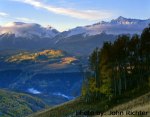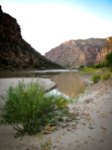 Kirsten and I had dinner with Soren and his wife Kristen while we were in Steamboat Springs last week. Soren is the son of my old Wasatch Advisors partner, Roy Jespersen, and it was good to catch up with Soren and find out what he was working on for The Wilderness Society. I was disappointed to learn that public land grazing is considered a third rail by The Wilderness Society, but encouraged about the work they were doing, along with ranchers, on protecting land that ought not to be drilled and mined. Soren published this about Salazar’s visit to the West recently. . . . more>>
Kirsten and I had dinner with Soren and his wife Kristen while we were in Steamboat Springs last week. Soren is the son of my old Wasatch Advisors partner, Roy Jespersen, and it was good to catch up with Soren and find out what he was working on for The Wilderness Society. I was disappointed to learn that public land grazing is considered a third rail by The Wilderness Society, but encouraged about the work they were doing, along with ranchers, on protecting land that ought not to be drilled and mined. Soren published this about Salazar’s visit to the West recently. . . . more>>
Category Archives: Environmental Economics
A second century of stewardship and engagement
 What a great title for legislation from a venerable name in U.S. conservation support. Yesterday Kirsten and I drove through the San Juan Mountains from Durango to Ouray, during the peak of fall colors, and we think it may be about the most beautiful landscape we have ever seen. So it is gratifying to see that there is right now a proposal to designate more than 60,000 acres in southwestern Colorado as either wilderness or a special management area back before Congress. U.S. Sens. Mark Udall and Michael Bennet are reintroducing the San Juan Mountains Wilderness Act, Continue reading
What a great title for legislation from a venerable name in U.S. conservation support. Yesterday Kirsten and I drove through the San Juan Mountains from Durango to Ouray, during the peak of fall colors, and we think it may be about the most beautiful landscape we have ever seen. So it is gratifying to see that there is right now a proposal to designate more than 60,000 acres in southwestern Colorado as either wilderness or a special management area back before Congress. U.S. Sens. Mark Udall and Michael Bennet are reintroducing the San Juan Mountains Wilderness Act, Continue reading
Preaching conservation without a choir
 Western politicians and special interest local factions have always been against the idea of protecting and conserving tracts of public land. It’s no different today. Kirsten and I were just in Moab this week — it’s now late in September– and the town is still packed with tourists. We had breakfast with a couple from upstate New York who were blown away by the vast beauty of the open West. Folks from around the U.S. and the world flock in for a taste of America’s wild heritage, to the point that we risk loving the land to death. Yet our local politicians speak as if conservation is a D.C. based political conspiracy that hurts the West. Interior Secretary Ken Salazar is in Utah promoting conservation this week. Is it representative that he gets the cold shoulder? . . . more>>
Western politicians and special interest local factions have always been against the idea of protecting and conserving tracts of public land. It’s no different today. Kirsten and I were just in Moab this week — it’s now late in September– and the town is still packed with tourists. We had breakfast with a couple from upstate New York who were blown away by the vast beauty of the open West. Folks from around the U.S. and the world flock in for a taste of America’s wild heritage, to the point that we risk loving the land to death. Yet our local politicians speak as if conservation is a D.C. based political conspiracy that hurts the West. Interior Secretary Ken Salazar is in Utah promoting conservation this week. Is it representative that he gets the cold shoulder? . . . more>>
Protecting the environment is good for the economy
 The Utah Foundation recently released its first biennial Quality of Life Index, based on a rigorously designed survey of what a representative cross-section of Utahns consider most important to their well-being. Environmental quality was near the top of the list. Robert Adler of the University of Utah in a Salt Lake Tribune op-ed wrote last week that, “The foundation’s findings also question the myth that environmental quality and jobs are antithetical values. In fact, the survey shows that Utahns value both a sound economy and a healthy environment as fundamental, co-equal requirements of their quality of life.”representative cross-section of Utahns consider most important to their well-being. Environmental quality was near the top of the list. Why in Utah, then, is the depiction “Environmentalist” a pejorative? . . . more>>
The Utah Foundation recently released its first biennial Quality of Life Index, based on a rigorously designed survey of what a representative cross-section of Utahns consider most important to their well-being. Environmental quality was near the top of the list. Robert Adler of the University of Utah in a Salt Lake Tribune op-ed wrote last week that, “The foundation’s findings also question the myth that environmental quality and jobs are antithetical values. In fact, the survey shows that Utahns value both a sound economy and a healthy environment as fundamental, co-equal requirements of their quality of life.”representative cross-section of Utahns consider most important to their well-being. Environmental quality was near the top of the list. Why in Utah, then, is the depiction “Environmentalist” a pejorative? . . . more>>
Help the Economy and Burn Fat!
 Count the ways that public lands and natural landscape are valuable. You might not have heard this one yet, but Jodi Peterson of High Country News says, “Two new studies show that public lands are valuable because – wait for it – they burn fat and generate dollars. A Forest Service study published recently estimates that last year, visitors to the nation’s forests burned a collective 290 billion calories. That’s 83 million pounds of body fat — measured in French fries, enough to reach to the moon and back.” Who knew? . . . more>>
Count the ways that public lands and natural landscape are valuable. You might not have heard this one yet, but Jodi Peterson of High Country News says, “Two new studies show that public lands are valuable because – wait for it – they burn fat and generate dollars. A Forest Service study published recently estimates that last year, visitors to the nation’s forests burned a collective 290 billion calories. That’s 83 million pounds of body fat — measured in French fries, enough to reach to the moon and back.” Who knew? . . . more>>
Bark Beetle Infestation Accelerating
 Kirsten and I are taking a drive through western Colorado next week, working our way up from Durango, through Silverton, Paonia, Steamboat Springs and the Rocky Mountain National Park to Denver for the Mountain and Plains booksellers trade show there. Along the way we are going to see alarming, heartbreaking swaths of rust colored evergreens. Warming winters have allowed waves of beetles to gnaw their way through millions of acres of forests in Utah and across the West. It’s sadly amusing to watch the western politicians blame a lack of logging. But the problem is climate change and the beetles are getting worse, not better. Brandon Loomis has a terrific essay in the Salt Lake Tribune yesterday covering the bark beetle sad state of affairs. . . . more>>
Kirsten and I are taking a drive through western Colorado next week, working our way up from Durango, through Silverton, Paonia, Steamboat Springs and the Rocky Mountain National Park to Denver for the Mountain and Plains booksellers trade show there. Along the way we are going to see alarming, heartbreaking swaths of rust colored evergreens. Warming winters have allowed waves of beetles to gnaw their way through millions of acres of forests in Utah and across the West. It’s sadly amusing to watch the western politicians blame a lack of logging. But the problem is climate change and the beetles are getting worse, not better. Brandon Loomis has a terrific essay in the Salt Lake Tribune yesterday covering the bark beetle sad state of affairs. . . . more>>
Environmental Economist
 Gernot Wagner is, as he admits amusingly, a seeming contradiction: an environmental economist. Readers will perceive a second contradiction: he’s an economist and policy wonk who you would actually want to talk to at a party. Unintended consequences are always a bugaboo with government policy. Wagner explains in his new book But Will the Planet Notice, How Smart Economics Can Save the Worldwhy the no expenses spared aspect of the Endangered Species Act makes it do more harm than good, but why a cap and trade is imperative. . . . more>>
Gernot Wagner is, as he admits amusingly, a seeming contradiction: an environmental economist. Readers will perceive a second contradiction: he’s an economist and policy wonk who you would actually want to talk to at a party. Unintended consequences are always a bugaboo with government policy. Wagner explains in his new book But Will the Planet Notice, How Smart Economics Can Save the Worldwhy the no expenses spared aspect of the Endangered Species Act makes it do more harm than good, but why a cap and trade is imperative. . . . more>>
Watch TV About Going Outside
Outdoor Channel today announced the launch of the second annual “Conservation Tour of Duty” as part of its Outdoor Channel Corps initiative. The Company’s Outdoor Channel Corps philanthropic effort mobilizes volunteers to restore and improve public lands and spaces to ensure that the outdoor lifestyle thrives in local communities across the U.S. Is it too ironic to watch TV about going outside? . . . more>>
Economics of Natural
 For the folks at Black Diamond, it’s not just about making climbing and skiing gear – it’s also about standing up to protect the resources and places that are not only important, but essential to the sports we all thrive on. In an open letter sent to Secretary of Interior Ken Salazar yesterday, Black Diamond CEO Peter Metcalf, along with representatives from more than 30 national outdoor brands, voiced his opposition to a potentially devastating proposed oil and gas development in Desolation Canyon, Utah. . . . more>>
For the folks at Black Diamond, it’s not just about making climbing and skiing gear – it’s also about standing up to protect the resources and places that are not only important, but essential to the sports we all thrive on. In an open letter sent to Secretary of Interior Ken Salazar yesterday, Black Diamond CEO Peter Metcalf, along with representatives from more than 30 national outdoor brands, voiced his opposition to a potentially devastating proposed oil and gas development in Desolation Canyon, Utah. . . . more>>
